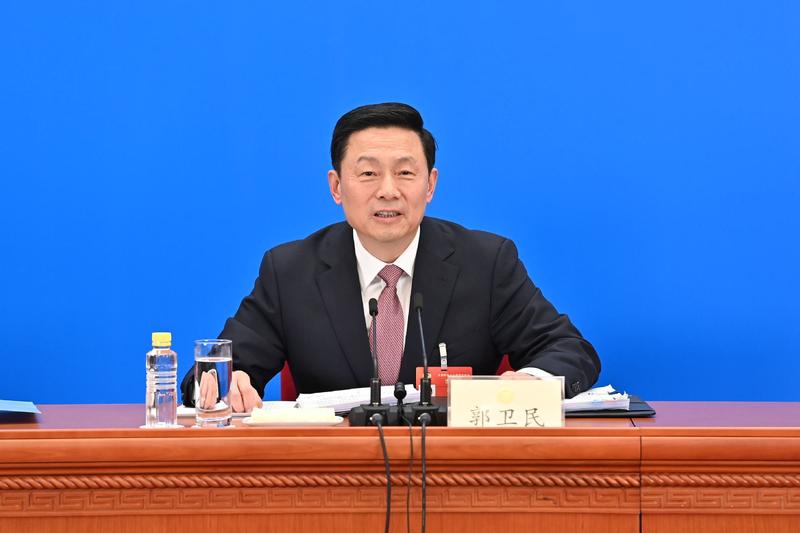 Guo Weimin, spokesperson for the fourth session of the 13th National Committee of the Chinese People's Political Consultative Conference, takes questions at a news conference on March 3, 2021. (XINHUA/PHOTO)
Guo Weimin, spokesperson for the fourth session of the 13th National Committee of the Chinese People's Political Consultative Conference, takes questions at a news conference on March 3, 2021. (XINHUA/PHOTO)
BEIJING - China's top political advisory body will open its annual session on Thursday, returning to its traditional March schedule after last year's session was postponed to May due to the COVID-19 epidemic.
But the fourth session of the 13th National Committee of the Chinese People's Political Consultative Conference (CPPCC) will be shortened in the second year in a row over epidemic control requirements, a spokesperson said Wednesday.
ALSO READ: Holding 'two sessions' in March shows China's confidence in virus fight
Discussions on the draft outline of the 14th Five-Year Plan and the long-range objectives through the year 2035 will be high on the agenda at this year's session, spokesperson Guo Weimin said
This year's session will last six and a half days, instead of about 10 days for sessions before 2020, Guo Weimin, spokesperson for the session, told a press conference.
Successful practices including streamlining the process and holding events both online and offline during last year's session will be adopted to improve the efficiency and quality of the session this year, Guo said.
Other than the opening and closing meetings, there will be two plenary meetings and six group meetings during the session, Guo said.
All the preparations for the session have been completed, Guo said.
Discussions on the draft outline of the 14th Five-Year Plan and the long-range objectives through the year 2035 will be high on the agenda at this year's session, said Guo.
During the session, political advisors will hear and deliberate a report on the work of the Standing Committee of the CPPCC National Committee and a report on how the proposals from political advisors have been handled, Guo said.
The political advisors will also sit in on the fourth session of the 13th National People's Congress as non-voting participants, hearing and discussing reports including a government work report, the spokesperson noted.
Foreign diplomatic envoys to China will be invited to observe the opening and closing meetings of the session, he added.
ALSO READ: Advisers' key proposal beefs up poverty alleviation fight
A number of Beijing-based Chinese and foreign reporters have been invited to cover the event at the Great Hall of the People, he said.
The CPPCC will continue to pool wisdom and strength to facilitate a business environment that is based on market principles, governed by law and up to international standards, said Guo Weimin, spokesperson for the fourth session of the 13th National Committee of the CPPCC
Improving business environment
The top political advisory body will continue to focus on issues related to further improving the country's business environment in 2021, Guo said.
The CPPCC will continue to pool wisdom and strength to facilitate a business environment that is based on market principles, governed by law and up to international standards, said Guo.
ALSO READ: China moves to boost business environment
Political advisors have given suggestions including ensuring foreign companies can fully enjoy China's opening-up policies and countering the uncertainty of the international business environment with certainty in the domestic business environment, he said.
Enhancing privacy and data protection
As for privacy protection, political advisors have done a lot of work in recent years in this regard, Guo said.
ALSO READ: Draft civil code emphasizes personality rights
Guo said the CPPCC held a teleconference on personal information protection and a symposium on AI-related ethical and legal issues last year.
Political advisors have proposed accelerating efforts to improve laws and intensify supervision and law enforcement to crack down upon activities that infringe on personal privacy and personal information security, Guo added.
Attempts to boycott 2022 Games 'doomed to fail'
Attempts to boycott the Beijing 2022 Olympic and Paralympic Winter Games are vain efforts that are doomed to fail, Guo said.
Actions by certain foreign politicians to politicize sports and disrupt the Beijing 2022 Games are against the spirit of the Olympic Charter, Guo said.
"We believe such actions will not win the support of the international community," he said. "Such plots are not going to prevail."
Guo added that some foreign leaders, including officials from the International Olympic Committee, have voiced their opposition to such actions, and preparations for the Games are going smoothly in spite of the COVID-19 pandemic.


